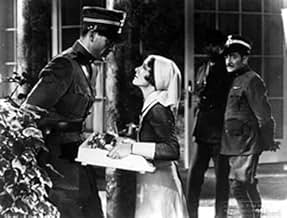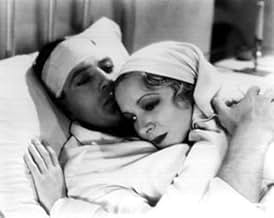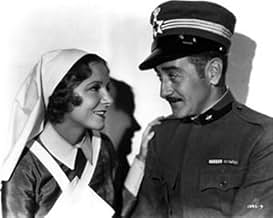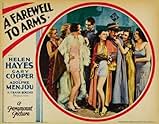Segui questa storia romantica e stimolante di un autista di ambulanze americano e un'infermiera inglese che si innamora in Italia durante la prima guerra mondiale.Segui questa storia romantica e stimolante di un autista di ambulanze americano e un'infermiera inglese che si innamora in Italia durante la prima guerra mondiale.Segui questa storia romantica e stimolante di un autista di ambulanze americano e un'infermiera inglese che si innamora in Italia durante la prima guerra mondiale.
- Regia
- Sceneggiatura
- Star
- Vincitore di 2 Oscar
- 7 vittorie e 2 candidature totali
- Cafe Girl
- (non citato nei titoli originali)
- Bonello
- (non citato nei titoli originali)
- Swiss Postal Clerk
- (non citato nei titoli originali)
- Giulio
- (non citato nei titoli originali)
- Gordini
- (non citato nei titoli originali)
- Swiss Nurse
- (non citato nei titoli originali)
- Italian Soldier
- (non citato nei titoli originali)
- Molly
- (non citato nei titoli originali)
- Piani
- (non citato nei titoli originali)
- Frustrated Opera Singer
- (non citato nei titoli originali)
Recensioni in evidenza
Actress Helen Hayes was already among the leading lights of the New York stage when she was lured to Hollywood for a handful of films in the early 1930s--and it is easy to see what all the fuss was about. Plaintive beauty aside, unlike most stage and screen actors of the era she is completely unaffected in her performance and proves more than powerful enough to overcome the more melodramatic moments of the script. She is costarred with Gary Cooper in one of his earliest leading roles, and while the pairing is unexpected, it is also unexpectedly good: they have tremendous screen chemistry, and in spite of the film's dated approach they easily draw you into this story of an ill-fated wartime romance between a nurse and an ambulance driver.
The film is also well supplied with a solid supporting cast that includes Adolphe Menjou, Jack La Rue, and Mary Philips, and while clearly filmed on a slim budget--something most obvious in the battlefront sequences--the camera work is remarkably good. Unfortunately, all this counts for nothing unless you can find a print of the film that you can stand to watch. It is sad but true: the 1932 A FAREWELL TO ARMS seems to have fallen into public domain, and the result is a host of DVD and VHS releases that range from the merely adequate to the incredibly dire.
Gary F. Taylor, aka GFT, Amazon Reviewer
Sensitive and romantic story about a deep and thunderous love story set in the horrors of the WWI when were developing the bloody battles of Marne and Piave. However, the novelist Hemingway disavowed the ambiguous final, but the public all around the world loved the movie. Both protagonists, Gary Cooper and Helen Hayes give awesome acting in one of the great love stories of all time. They are finely accompanied by a nice support cast at the time, such as : Adolphe Menjou, Jack La Rue, Mary Philips, Mary Forbes, among others.
The motion picture shot in Paramount studios was well directed by Frank Borzage and it won Oscars 1933 to Cinematography : Charles Lang Jr and Sound. Filmmaker Frank Borzage was a notorious actor and director who made a lot of decent films from Silent cinema to Sound one , such as : Street angel, Flight command, Big city , Bad fire, The mortal storm, Billy the Kid, The big fisherman, being his greatest hit : The 7th Heaven. Rating 7/10 . Better than average. Well worth watching. The picture will appeal to Gary Cooper fans.
Other version about this famous story are as follows : A farewell to arms 1957 by Charles Vidor and John Huston with Rock Hudson, Jennifer Jones, Vittorio de Sica, Oscar Homolka. A farewell to arms 1966 by Tucker with Vanessa Redgrave and George Hamilton. In love and war 1996 by Richard Attenborough with Chris O'Donnell, Sandra Bullock , Mackenzie Astin.
In the supporting cast are Mary Phillips (Helen Ferguson, a nurse and Catherine closest friend who objects to her continued romance with the young American); Jack LaRue (the soft-spoken Italian priest); and Blanche Frederici (the stern head nurse). Adolphe Menjou offers fine characterization of an Italian, convincing, right down to his spoken dialect.
A highly popular war drama in its day, which concentrates more on the relationship between a lieutenant and a nurse than soldiers on the battlefield, A FAREWELL TO ARMS earned itself an Academy Award nomination for Best Picture of 1932-33, but none for its acting. Director Borzage brings out the tenderness and simplicity of the young couple in love as he had done many times during his career, especially those starring Janet Gaynor and Charles Farrell over at Fox Studios. In fact, had Hemingway sold his novel to Fox, A FAREWELL TO ARMS would definitely have been awarded to the popular Gaynor and Farrell team under Borzage's direction. Yet similarities between Gaynor and Farrell and Hayes and Cooper go by the way of their sizes. Both Gaynor and Hayes were short in appearance while Cooper and Farrell stood very tall, especially opposite their shorter leading ladies. Because of the sensitivity and care as enacted by the central characters, it goes without saying that Hayes and Cooper appear to be far better suited than Gaynor and Farrell had they been offered this assignment. At first glance, Cooper gives the impression of being an odd choice for playing Fredric Henry, considering solid actors as Fredric March or Clark Gable (on loan from MGM) might have made a go of this. For the finished product, the film conveys Cooper to be properly cast after all, ranking this as one of his most finer performances of his career.
The pace to the story is occasionally slow, with the early portions lacking in underscoring, but does get better during its second half. Other than the character study and battle scenes, the movie offers some fine bonuses in ways of effective camera technique, including the hospital scene where the injured Frederic Henry is being wheeled in the hospital from a platform table where the camera assumes the place of the character, taking focus as to what directly looking down and talking into the camera range as Frederic answers the questions. This is concluded with an extreme close up of Catherine's face with only her right eye in full focus into the camera as she kisses and talks to her wounded soldier. The camera taking the place of the character technique would be used memorably more than a decade later in the "film noir" mysteries, LADY IN THE LAKE (MGM, 1946) and DARK PASSAGE (WB, 1947). While these films have used this method to an extent to most of the story, A FAREWELL TO ARMS presents this technique briefly but effectively.
Remade twice during the 1950s, first as FORCE OF ARMS (Warner Brothers, 1950) starring William Holden and Nancy Olson, and later under its original title in 1957 for 20th Century-Fox starring Jennifer Jones and Rock Hudson, the third, being the better known of the earlier two, might have surpassed the original had it not been so awkward, overlong (two and-a-half hours) and overblown. The original 1932 production, eliminating many key elements from the novel, is better acted and not long enough to cause any viewer lose interest. Because of the remakes in the 1950s, the 1932 original was taken out of circulation, with availability for viewing the original very hard to obtain, and chances of it never to be seen or heard about again. Fortunately, prints did survive, leaving chances of A FAREWELL TO ARMS to surface again. Finally, as early as 1981, the initial version to A FAREWELL TO ARMS made its long awaited rebirth, on public television, initially as part of its weekly SPROCKETS series. Ever since then, television and later public domain video prints presented the original Hemingway drama 10 minutes shorter to its original 90 minutes of screen time, along with occasional poor picture quality, and even worse, the elimination of the original opening and closing credits taken from reissue prints with newer opening title cards and the substitution of the Paramount logo with that of a 1950s Warner Brothers shield, and the elimination of the closing casting credits. When A FAREWELL TO ARMS premiered on Turner Classic Movies on Sunday, February 15, 2004, as part of the cable channel's annual 31 days of Oscar, it became another long-awaited event. Aside from having it shown in its original 90 minute presentation, the Paramount logo that opens and closes the movie has been restored along with the closing cast list, as originally played in theaters back in 1932.
Has A FAREWELL TO ARMS stood the test of time? Chances are with its newly restored and clearer picture quality presentation currently available on TCM, it may stir up much more interest than the latter remakes. It also gives an incite look to the early film career of famous stage actress Helen Hayes (1900-1993) at her peak. As it stands, A FAREWELL TO ARMS, a poignant love story, which may not stir up as many tears and sobs as it once did way back when, it is, however, a worthy novel to screen offering, ranking this the first, and best, of two remakes combined. (****)
Yet, it doesn't feel like a classic. The romance seems trite and contrived. Overly schmaltzy and sometimes just plain dull.
The acting is patchy. Gary Cooper is okay, but Helen Hayes' performance is quite flat. Most entertaining performance comes from Adolphe Menjou as Rinaldi.
It was probably quite good in its time, and might well be regarded as one of the first anti-war movies, but it now feels quite dated.
In a story not much different than what you might have read in high school, Lt. Henry (Gary Cooper) is an American ambulance corpsman serving with the Italian Army as it fights the Austrians along the Piave, a bloody backwater campaign of World War I. Henry meets nurse Catherine Barkley (Helen Hayes) and they quickly fall in love. But the violence of war, and the interference of friends like Capt. Rinaldi (Adolphe Menjou), threaten to tear them apart.
The differences between book and movie are more in the matter of treatment than storyline. When Catherine and Lt. Henry first meet, they talk about her former lover, a war casualty. In the film, she says "If I had to do it all over again, I'd marry him". In the book, though, Catherine wasn't regretting sending him off to war unmarried, but without their having had sex.
Yet a minute later, her lines come directly from the book, Catherine noting her daydreams about her old lover turning up at her hospital with a saber cut, then adding: "He didn't have a saber cut, they blew him to bits." For Hollywood, violence was always easier material than sex.
Since this is a film made before the inhibiting Hays Code (Will, not Helen), Borzage and his writers are able to get away with a bit more than they would have just a couple of years later. Catherine and Henry still make love, and she gets pregnant.
There IS a lot of Hemingway here. Catherine is a still somewhat mixed-up woman who hates the rain "because I see myself dead in it". The folly of war is openly expressed. "If nobody would attack, the war would be over," one soldier muses. Lt. Henry is wounded, and embarrassed because it happened while he was eating cheese. Even some small exchanges survive, like one between Lt. Henry and a nasty nurse.
She: "Pity is wasted on you."
He: "Thank you."
But the film also strikes out for its own territory, successfully in the case of building up the role of Capt. Rinaldi. Menjou, who had been a real ambulance corps captain in World War I, creates a marvelously ambiguous figure, a cheerful cynic who befriends Henry and is put out by the romance with Catherine. "Why don't you be like me?" Rinaldi asks his "war brother". "All fire and smoke. Nothing inside."
Rinaldi's role here is a change from the original story, a gamble by Borzage and writers Benjamin Glazer and Oliver H. P. Garrett that pays off, devising some needed tension to the central storyline and underscoring the core message of the rottenness of war. If it wasn't for war, Rinaldi might value something more than his next bottle or bedpartner, and Menjou, in a final triumphant moment, lets you know it.
Pacifism, in movies as in life, only takes one so far. The film makes a mistake near the end by more consciously making a stand as an anti-war film, with much hysteria, bells ringing, even Cooper chanting "Peace...peace". It made those points much better as sidenotes, like an opening tracking shot where a seemingly sleeping soldier is revealed to be dead, or later on when Cooper trudges through a muddy path and notices the corpse everyone's been walking on. By contrast, too much of the movie's finale is played for the cheaper seats, and doesn't stand up today.
But the film does stand up better than many later Hemingway adaptations, with its strong cast, inspired tracking shots, and a mostly successful effort by Borzage to translate Hemingway's terse prose style into film. What you get is a short but deep examination of life during wartime.
Lo sapevi?
- QuizErnest Hemingway hated this interpretation of his novel, as he felt it was overly romantic. That didn't stop him, however, from becoming lifelong friends with Gary Cooper, whom he met several years later. In fact, it was Hemingway who would insist that Cooper be cast in the lead of the adaptation of his novel Per chi suona la campana (1943) 11 years later. However, the two made a point of never discussing this film.
- BlooperA night attack is shown. During World War I there was very little flying at night and the night attacks that did occur were limited to big cities. It was almost impossible for a plane to attack specific targets in a large city, so effectively attacking people on a road in the dark was not possible, and did not happen.
- Citazioni
Frederic: We've never been apart, really. Not since we met.
Catherine: Not since we met.
Frederic: And never can be.
Catherine: Never apart.
Frederic: In life and in death. Say it Cat.
Catherine: In life and in death, we'll never be parted.
Frederic: You do believe that, don't you, Cat?
Catherine: I believe it, and I'm not afraid.
- Curiosità sui creditiIn the original 1932 credits, the credits are punctuated by aerial bomb blasts, and every time there is a blast, a credit disappears to be replaced by the next one.
- Versioni alternativeSPOILER: Paramount decided, after much disagreement, to keep Hemingway's original ending and fade out after the death of Catherine Barkley. This ending was kept for the European release, but a new ending in which Barkley lives was later added to the U.S. release.
- ConnessioniEdited into Your Afternoon Movie: Farewell to Arms (2023)
I più visti
Dettagli
- Data di uscita
- Paese di origine
- Sito ufficiale
- Lingue
- Celebre anche come
- Adiós a las armas
- Luoghi delle riprese
- Azienda produttrice
- Vedi altri crediti dell’azienda su IMDbPro
Botteghino
- Budget
- 799.520 USD (previsto)
- Tempo di esecuzione
- 1h 20min(80 min)
- Colore
- Proporzioni
- 1.37 : 1

























